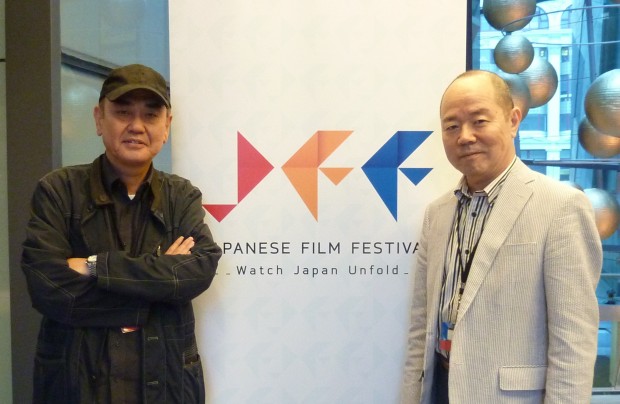Japanese filmmaker Kiyoshi Sasabe and actor Seishiro Nishida talk Tokyo Refugees and Three Sisters
DIRECTOR Kiyoshi Sasabe and actor Seishiro Nishida were recently in Melbourne to promote their films Tokyo Refugees and Three Sisters at the 2014 Japanese Film Festival. Yuzuha Oka caught up with the Japanese talents.

Japanese filmmaker Kiyoshi Sasabe (left) and actor Seishiro Nishida (right) talk to Meld about the films they had screening at this year’s Japanese Film Festival. Photo: Yuzuha Oka
Australian audiences at this year’s Japanese Film Festival were treated to special guest appearances from filmmaker Kiyoshi Sasabe and actor Seishiro Nishida. Sasabe had two films screening at the festival, Tokyo Refugees and Three Sisters with Nishida starring in the latter.
With Tokyo Refugees, Sasabe wanted to ground the film in reality considering its dark subject matter. Focusing on the struggle of Osamu Tokieda, an ordinary university student who one day is expelled due to his unpaid tuition fees, the film plays out like every student’s nightmare.
Gradually, Osamu is kicked out of his apartment, unable to pay his rent, and has no choice but to sleep in a 24 hour internet cafe.
“The first half of the film is rather a monologue of Osamu, as he topples down from an ordinary student to homeless. If it weren’t realistic, the audience wouldn’t empathise with the drama in the latter part,” says Sasabe.
To form the film’s reality-based narrative, Sasabe conducted a thorough research into the world of “poverty business,” where the poor are exploited in severe working conditions. Part of this included probing into the sex industry and looking into the nature of day labourers at construction sites.
Not many young people think about what to do when they suddenly lose their home, money and family. Through the film, Sasabe wanted young people to find their safety net in advance.
“For example, there are scholarship systems if you cannot pay tuition fees. But many young people are not aware of the support that’s available in case of an emergency.”
Sasabe also fears the change in the way young people communicate nowadays. More than thirty years ago, the director himself was a college student coming to Tokyo from his country town in the far west of Japan.
“I was poor, but my friends and I would gather in my small room and chat about our dreams.”
With a daughter of his own now who is heading to college, he reflects that young people are lacking face-to-face interaction.
“People are obsessed with screens. They are always handling with their smart phones and PCs, talking to random people over the screen. When did Japan become such a country?”
This sense of crisis has motivated Sasabe to make the film.
He had previously screened Tokyo Refugees before an audience of college students, prior to its national premiere in Japan.
“When I talked with the audiences after the screening, one boy complained about his experience in part time job,” reflected Sasabe.
“He said people never call his name. It’s either ‘hey, you!’, ‘that student’, or ‘a part-timer.'”
“In the movie, there is a phrase I really cherished towards the end. ‘Can I keep living on as Tokieda Osamu?’
“I think the richness of human interaction lies in the face-to-face communication, calling people by their names and not by online handle names.”
While Tokyo Refugees was certainly a dark story, Sasabe’s other film, Three Sisters, was described by the filmmaker as having “a lighter, comedic style”.
Three Sisters is a tale of three beautiful sisters and their parents who run a Japanese confectionary store in a deserted shopping arcade in Kagoshima, a country area in the far south-west of Japan.
Actor Seishiro Nishida, who originally starred in the theatre play that the movie was based on, was initially taken back when the idea to turn the play into a film was propositioned.
“[A] movie can be seen by broader audiences, compared to a theatre. So I thought it would be a good opportunity to show the scenery, food culture and human drama in my hometown Masago, Kagoshima.”
Nishida first worried that a director would not accept the offer to make a film, due its extremely low budget.
“But director Sasabe told me, ‘It’s not about the budget. I judge by the script,” said Nishida.
According to Sasabe, “My motivation lies in a great script. A good movie [features] 70 percent plot, 20 percent an image and 10 percent actors.”
In Three Sisters, each family member has little luck in marriage. The eldest daughter returns home after being divorced; the second sister is in the middle of mediation; the youngest’s engagement is dissolved; and their parents are divorced.
“The underlying theme of Three Sisters is ‘what is marriage?’ and ‘what is family?’,” says Nishida who was also delighted by Melbourne’s warm welcoming of the film.
“Maybe they were laughing harder than the Japanese audiences. It was well beyond what we have expected.”
Appealing to different audiences, Tokyo Refugees’ and Three Sisters’ contrasting tones is proof of Sasabe’s skill as a craftsman, he says.
“My motto is to create any kind of film with a low cost, [that’s] quick and good. It’s my job to make any stories into a good movie.”
Whatever film Sasabe decides to invest his efforts into, the filmmaker demonstrates absolute faith in the material and his own ability to construct a meaningful tale.
“I never want the audience to walk out of a cinema depressed. I want my movies to give people a hope to live tomorrow. In my films, there is always a light at the end of a long tunnel.”



